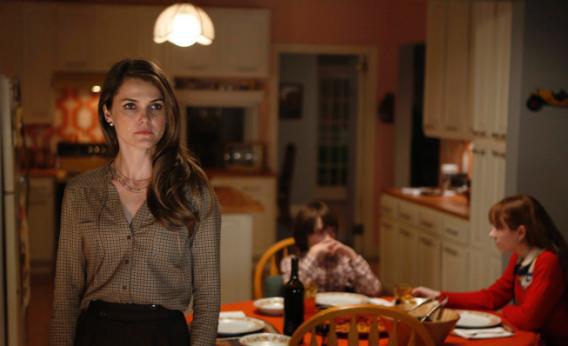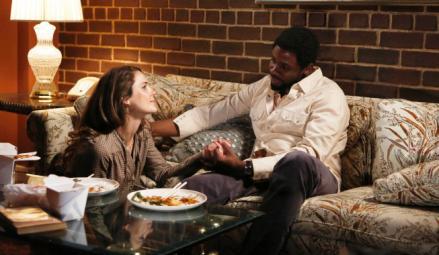Earlier this week, Elliott Holt and I talked about the ways this episode of The Americans pitched thoughts against feelings—ideology versus love—but “Only You” is also full of profound reflections about the places we live. Where do we truly feel comfortable, and who or what do we need there to make it feel like home?
Even before it gets to the question of whether Gregory Thomas, a black civil rights activist turned superefficient KGB operative, could be happy in Moscow, the episode is suffused with talk of home. The first image shows Philip and Elizabeth pulling up to the drab motel where Philip is staying. It looks awfully similar to their first stop in America, the hotel room where Philip marveled at the wonders of air conditioning. Now that he’s been spoiled by creature comforts, his standards are much higher. “Home sweet home,” he mumbles, self-pityingly, and when Elizabeth starts to argue, he tells her, “Go home.” A little later, in the FBI vault—a surprisingly homey room where the chairs are comfortable, portraits hang on the wall (albeit of most-wanted targets rather than family members), and secrets can be shared—Agent Gaad tells Stan Beeman, “Go home. Get some rest.”
Stan would prefer to stay and work, but rather than contravene orders, he goes to Philip’s motel, where a little drunk and slurring, he tells Philip about all the “shitty motel rooms” he slept in during his time undercover. Rooms like this are depressing and impersonal. “No matter where you are, no matter what city or town, you’re always in the same place,” he says.
Philip offers to drive Stan home, but the next place we see Stan is in the safe house the FBI has given him to rendezvous with Nina. It has all the trappings of home, but it’s a soulless place with no music, no art. For once they sit on the couch, rather than the bed, but their talk is of Amador and Vlad, friends they have lost. Meanwhile, over at the Jenningses’ place, Elizabeth is bickering with the kids and then with Philip when he shows up uninvited.
No one is happy in the places where they’re supposed to be most comfortable. In fact, the first glimpse of a home that seems cozy and warm is Gregory’s apartment: Jazz is playing, there are paintings and photos on the walls, a worn, woolen throw over the back of the sofa. It’s a place where he can relax—until he’s summoned by Elizabeth’s signal and eventually learns that his life in America is over. When Grannie describes the life he could have in the Motherland, the first thing she mentions is “a nice apartment.” Everyone knows that moving to Moscow would be a drastic upheaval, but Philip points out that the alternative is “life in a cage—or 1,000 volts running through his body.”
Then suddenly everyone’s talking about getting away. Gregory tells Elizabeth, “Let’s just get out of here, you and me.” She refuses, though she can’t say why. Sandra Beeman begs Stan: “We could just leave. I don’t care where we go. We could live in a shack, and I wouldn’t care.” But no one can escape. The Beemans are held in place by his sense of duty, and the Directorate S officers are kept on a tight leash by Grannie, who describes herself as a guard dog rather than a bodyguard. She isn’t protecting Philip and Elizabeth. She’s protecting the KGB. “That’s why they sent me halfway around the world,” she tells Gregory.

Photo by Craig Blankenhorn/FX
In the end, though, the focus is on Gregory’s decision. “I won’t take to Moscow,” he says, and despite Elizabeth’s attempts to persuade him of the Soviet capital’s cosmopolitan delights, his decision to die in a hail of bullets seems like a happy one. Unlike the rest of them, he has a home. “I lived here, I fought here,” he tells Elizabeth, and when he leaves the safe house—a cold, impersonal place that was transformed into a cozy love nest when he and Elizabeth were eating Chinese food and hanging out together there—he seems more content than any of the people he’s leaving behind.
In the amazing final scene—which intercuts 17 shots of sad departures, lonely meals in dismal motel rooms and family dining rooms, KGB officers sending the body of a fallen comrade home to his final rest, and Stan in his cubicle at FBI headquarters, along with the shootout—Gregory’s fate almost feels like the most desirable. He goes out on his own terms, on his own streets, of his own volition. The rest of them are trapped at home, and they’re miserable there.
